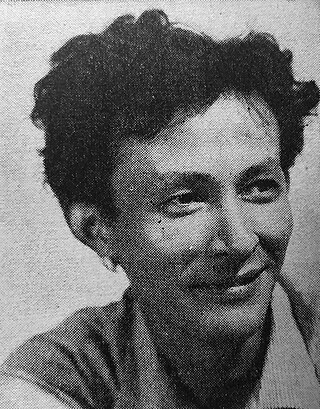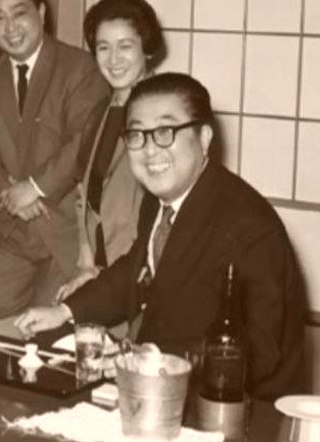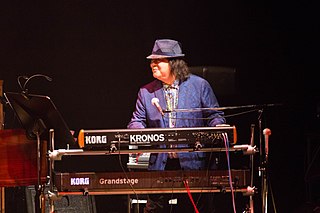Cymbals (シンバルズ) was a Japanese rock band active from 1997–2003. The trio was composed of vocalist Asako Toki (土岐麻子), bassist/guitarist Reiji Okii (沖井礼二), and drummer Hiroyasu Yano (矢野博康). Like other Japanese bands which emerged in the late 1990s, Cymbals were strongly influenced by the British pop-rock sounds of the 1960s. Due to their eclectic blend of styles, the band is often linked to Shibuya-kei. Despite solid songwriting and album production, they never scored a true "hit", which eventually resulted in the band's breakup in September 2003. They played a final 90-minute farewell concert at Shibuya O-East on January 20, 2004. The group's members remain musically active – Toki as a solo artist, Okii as a producer, and Yano as a session drummer and producer.

The Roosters are a Japanese rock band formed in Fukuoka Prefecture in 1979. Their music has mixed rock and roll, punk rock, British blues, ska, and new wave. Originally active from 1979 to 1988, they performed at the 2004 Fuji Rock Festival before restarting activities in 2009. Through the years, guitarist Hiroyuki Hanada remained the only constant member, with the band currently consisting of the original lineup. In 2003, HMV Japan ranked the Roosters at number 75 on their list of the 100 most important Japanese pop acts. In September 2007, Rolling Stone Japan rated their album Good Dreams number 28 on its list of the "100 Greatest Japanese Rock Albums of All Time".

The Peanuts were a Japanese vocal group consisting of twin sisters Emi and Yumi Itō. They were born in Nagoya, Japan on April, 1 1941. As identical twins they had voices only slightly apart in timbre, which resulted in their singing together sounding like a solo artist utilizing double tracking or reverb.

Alan Price is an English musician who first found prominence as the original keyboardist of the English rock band the Animals. He left the band in 1965 to form the Alan Price Set; his hit singles with and without the group include "Simon Smith and the Amazing Dancing Bear", "The House That Jack Built", "Rosetta" and "Jarrow Song". Price is also known for work in film and television, taking occasional acting roles and composing the soundtrack of Lindsay Anderson's film O Lucky Man! (1973). He was inducted into the Rock and Roll Hall of Fame in 1994 as a member of the Animals.
Yōsui Inoue is a Japanese singer, lyricist, composer, guitarist and record producer, who is an important figure in Japanese music. He is renowned for his unique tone, eccentric lyrics, and dark sunglasses which he always wears.
Kenji Sawada is a Japanese singer, composer, lyricist and actor, best known for being the vocalist for the Japanese rock band The Tigers. Nicknamed "Julie" because of his self-professed adoration of Julie Andrews, he was born in Tsunoi, Iwami, Tottori Prefecture, Japan, and raised in Sakyo-ku, Kyoto at age 3.

The Golden Cups are a Japanese pop and rock band, who were one of the top bands performing in the Group Sounds scene in the late 1960s.
Pyg was a Japanese rock supergroup, composed of members from well-known bands of the group sounds era: The Spiders, The Tempters and The Tigers. The spelling "Pyg" was suggested by Alan Merrill, who shared the same management at the time, Watanabe Productions.
Chōsuke Ikariya was a Japanese comedian and film actor, and leader of the comedy group The Drifters. His nickname was "Chō-san" (長さん).

Susumu Fujita was a Japanese film and television actor. He played the lead role in Akira Kurosawa's first feature, Sanshiro Sugata, and appeared in other Kurosawa films including The Men Who Tread On the Tiger's Tail and The Hidden Fortress. Later, he was a supporting actor in Ishirō Honda's Mothra vs. Godzilla, among many other films.

The Spiders were a Japanese rock band formed in Tokyo in 1961, as one of the leading groups of the Group Sounds genre.

Hideyo Amamoto was a Japanese actor. He is best known for portraying Dr. Shinigami in the original Kamen Rider series as well as many other characters in tokusatsu films such as the Godzilla series. Amamoto also used the pseudonym of Eisei Amamoto for most of his career, Eisei being a misreading of the kanji in his real name, Hideyo. He died on March 23, 2003, of complications from pneumonia at 77.

Kazuhiko Katō, nicknamed "Tonovan" (トノヴァン), was a Japanese record producer, songwriter and singer. He sometimes used the spelling of "Kazuhiko Katoh".
The Mops were a Japanese psychedelic rock/garage rock group active in the late 1960s and early 1970s. They were one of the most notable bands of the group sounds genre.

Yōko Tsukasa is a Japanese actress. During her 60 years spanning career, she worked with directors such as Yasujirō Ozu, Mikio Naruse and Akira Kurosawa. For her role in The Kii River (1966) she was awarded the Blue Ribbon Award, Mainichi Film Award and Kinema Junpo Award for Best Actress.

Sanezumi Fujimoto was a Japanese film producer. He served as the head of production for Toho Studios. He was co-producer of Akira Kurosawa's The Hidden Fortress. He also produced many other films, including Yasujirō Ozu's The End of Summer, Kihachi Okamoto's The Sword of Doom and Japan's Longest Day and several films directed by Mikio Naruse.
Naifu were a Japanese 4-piece rock band formed in 2007 under Giza Studio label. Naifu disbanded in 2009. Their management office was Ading.

Mitsuyoshi Yoshino, known professionally as Mickie Yoshino, is a Japanese keyboardist, composer, producer, and arranger. Yoshino is known for leading the rock band Godiego. In 2005, he won a Japan Academy Prize for his music. Yoshino's compositions were used in the film Swing Girls. Yoshino still produces music with groups such as Godiego and EnTRANS.
Hisato Takenaka, known professionally as Char, is a Japanese musician, singer-songwriter and record producer. He is considered one of Japan's greatest guitar players.
Minami Ichikawa is a Japanese businessman and film producer. An executive officer at Toho Co., Ltd., Ichikawa is the head of their Motion Picture Group, the Chairman of Toho Cinemas, the director of Toho-Towa and the former President of Toho Pictures.










